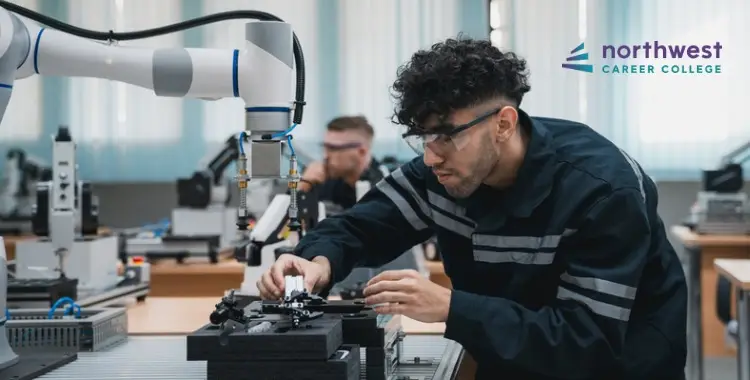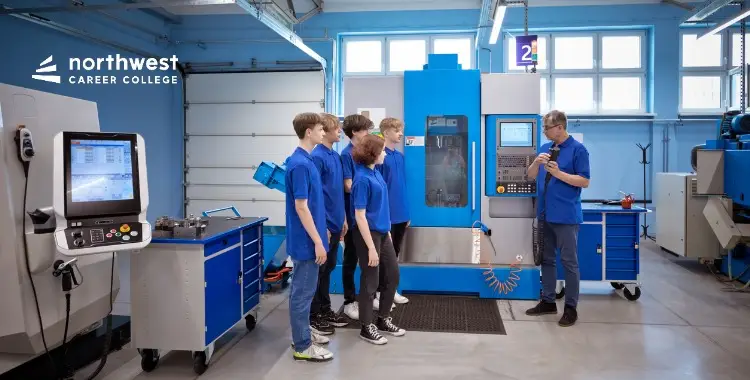What Are The 5 Benefits of Trade School?
- Trade School
- March 21, 2025
- 2.1k views
- 4 min read

Busy college campuses, all-night study sessions, and bachelor’s degrees typically come to mind when “higher education” is mentioned. Indeed, it is a door for most individuals to many promising career opportunities.
It is important to note that there are alternative paths to success for individuals who may not want to pursue traditional higher education. Trade schools can be an excellent option for those more interested in practical, hands-on learning. These schools offer focused education and training in specific trades or industries, providing students with the skills and knowledge they need to enter the workforce.
According to the National Center for Education Statistics (NCES), 38% of the students who started the journey toward a bachelor’s degree in 2012 had yet to complete it six years later. This raises the serious question: Is there a way that would be more direct and efficient for you to achieve your career goals?
Table of Contents
What is Trade School?
A trade school, known in the United States as a vocational school or a technical college, offers students specialized training programs to acquaint them with their professions in some trades or divisions.
Unlike the usual four-year institutions such as colleges and universities, most technical or trade schools focus on hands-on training rather than theoretical or didactic education. Students in trade schools learn and receive training in their interested vocation. Examples of vocational programs include welding, auto repair, plumbing, cosmetology, culinary arts, and health vocations (such as medical assistant, dental assistant, or pharmacy technician programs).
Trade schools are usually short-duration, intensive programs that result in certification or a license—getting their students into the job market in the least time possible to pursue professions in industries with the highest demand generally.
Career-Focused Training
Hands-On Learning
An important thing to know about trade schools is that hands-on learning typically starts on day one. You won’t spend several years stuck in a book before learning practical, real-world skills that can help you earn a living.
Specialized Expertise
Trade schools offer training programs aligned to particular industries and careers. From welding to automotive repair to culinary arts, vocational schools offer specialized training that will equip you with the necessary skills to succeed in the field of your choice.
Faster Entry into the Workforce
Students of trade schools usually complete programs much faster than the traditional four-year degree, meaning they get out in the workforce and earn a paycheck while their counterparts from college are still hitting the books.
Gitnux reported that almost 74% of the graduates of trade schools land a job after graduation, while only about 64% of bachelor’s degree holders do.
Cost-Effective Education
Affordability
Programs through trade schools typically cost less than a traditional college degree program. Tuition is much cheaper, and since the timeframes to complete their programs are often much shorter, trade school students can graduate with much less debt than students attending traditional colleges or universities but still receive a quality education and valuable training.
Quick Return on Investment
Since trade school programs run for less time, you’ll get to start enjoying the rewards with a paycheck earlier than most of your university-going peers. In other words, you’ll start building your career and financial footing with short-term student loan debt.
Job Opportunities and Stability
In-Demand Skills
Trade school is poised to provide accurate, applicable skills for today’s workforce. There’s an enormous industry out there looking for trade professionals with skills that range from health care to construction, information technology, and manufacturing.
Job Security
Skilled trade occupations are essential in many industries, and such occupations are at relatively low exposure to either automation or offshoring. You will have increased job security and occupational stability once you master that trade.
Potential for Advancement
Trade school equips you with the building blocks for continuing education and career growth. With experience and more certifications, you can become a manager or even start a business in that trade.
Conclusion
Trade school offers many benefits to give you an easy head start in your career, leading to success. From hands-on training to specialized expertise and affordable job opportunities, there is so much to love with a trade school education.
So, if you’re looking for a more feasible, convenient, and rewarding route toward a successful career, consider some of the significant benefits of trade school and step toward professional success!



